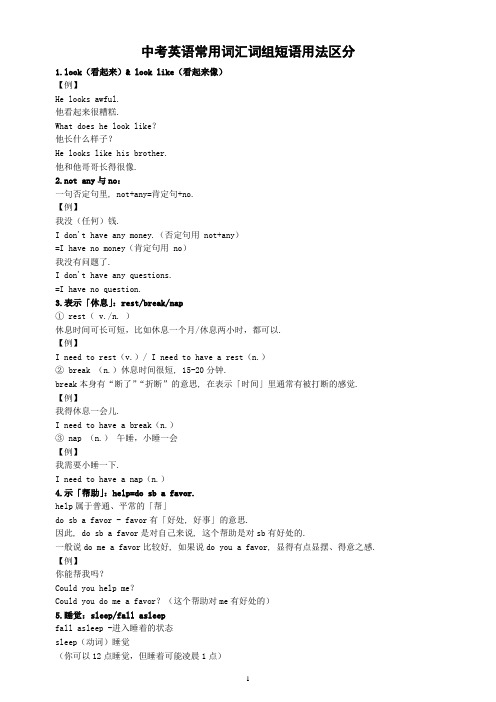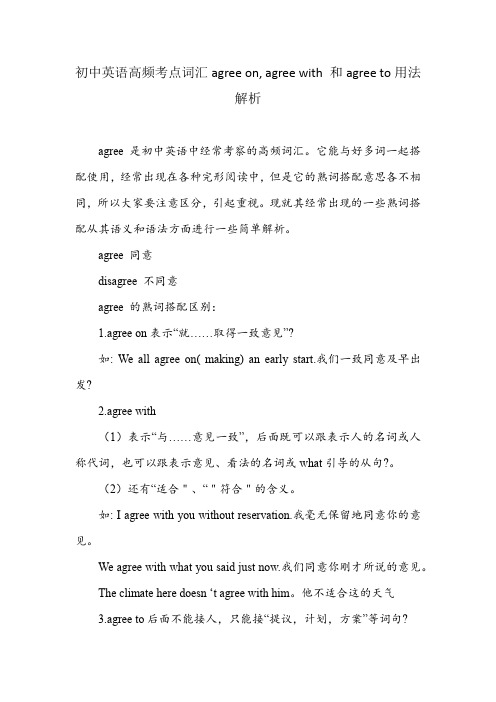初中英语重要词汇的用法及区别
英语初中常用易混淆单词词组的区别用法

中考初中英语常用易混淆单词词组的区别用法英语常用易混淆单词/词组的区别用法一、how much和how many的区别用法how much和how many的区别:how much用来询问事物的数量,后接不可数名词;how many用来询问事物的数量,后接可数名词复数。
how much和how many的区别1、所修饰词不同how much用来修饰不可数名词,表示数量,也可单独使用。
how many用来修饰可数名词的复数,它的句式是:How many+复数名词+一般疑问句+?例句:How much milk is there in the glass?玻璃杯里有多少牛奶?How many books are there on the desk?有多少本书在桌子上?2、用法不同How much 表示多少钱,用来问价格。
例句:How much is this dress?这个连衣裙多少钱?How many 表示多少,用来问数量。
例句:How many apples do you have?你有多少苹果?二、in和on的区别用法当我们表示某些东西被其他东西所包围时使用“in”这个词。
而“on”用于描述物体被放置在其他物体上方或外部的情况。
in可表时间,表地点,表手段、方法、材料。
on表示时间、地点、方位等。
in和on区别一、意思不同in:prep. 在 ... 里;在 ... 地方;在 ... 期间on:prep. 在 ... 之上二、用法不同in: in着重一段时间的过程,常用于重复动作或延续动作。
in表示从现在时间算起推移到将来的一段时间之后,一般与将来时态连用。
例句:He is a layman in economics.他对经济学一窍不通。
on:表示“在物体的表面上”,只能用on的表达方式有on the next morning,on the following。
例句:The spider is walking on the ceiling.蜘蛛在天花板上爬行。
初中英语词汇辨析30组

There are some new books on the desk. 桌子上有一些新书。 Would you like some water? (表征求、询问) 您来点儿水吗?
Are there any new books on desk? 桌子上有新书吗?
There isn’t any milk in the glass. 杯子里没有牛奶了。
词汇
用法
long before 很早以前;在……以前很久
before long 不久以后
8.alone / lonely
例句
He retired long before the war. 他在战争之前早就退休了。 Long before morning, all was done again. 天还没亮,一切又重新开始。 It won't be long before you regret what you have done. 过不了多久,你就会后悔你做的事。 Before long, we were deep in conversation. 我们很快就进入深谈。 I'll be seeing you before long. 不久,我就会见到你。 We'll see why before long. 我们不久后将看到为什么。
When did you get home / there / here?
12.agree with / agree on(upon) / agree to
词汇 agree with agree on (agree upon)
agree to
用法
例句
agree with sb. agree with sth.
初中英语中考常用词汇词组短语用法区分(共24组)

中考英语常用词汇词组短语用法区分1.look(看起来)& look like(看起来像)【例】He looks awful.他看起来很糟糕.What does he look like?他长什么样子?He looks like his brother.他和他哥哥长得很像.2.not any与no:一句否定句里, not+any=肯定句+no.【例】我没(任何)钱.I don't have any money.(否定句用 not+any)=I have no money(肯定句用 no)我没有问题了.I don't have any questions.=I have no question.3.表示「休息」:rest/break/nap① rest( v./n. )休息时间可长可短,比如休息一个月/休息两小时,都可以.【例】I need to rest(v.)/ I need to have a rest(n.)② break (n.)休息时间很短, 15-20分钟.break本身有“断了”“折断”的意思, 在表示「时间」里通常有被打断的感觉. 【例】我得休息一会儿.I need to have a break(n.)③ nap (n.)午睡,小睡一会【例】我需要小睡一下.I need to have a nap(n.)4.示「帮助」:help=do sb a favor.help属于普通、平常的「帮」do sb a favor - favor有「好处, 好事」的意思.因此, do sb a favor是对自己来说, 这个帮助是对sb有好处的.一般说do me a favor比较好, 如果说do you a favor, 显得有点显摆、得意之感. 【例】你能帮我吗?Could you help me?Could you do me a favor?(这个帮助对me有好处的)5.睡觉:sleep/fall asleepfall asleep -进入睡着的状态sleep(动词)睡觉(你可以12点睡觉,但睡着可能凌晨1点)【例】我昨晚12点就睡了, 但1点才睡着.I went to sleep at 12 last night, but I fell asleep at 1.6.in time及时/on time准时比如:约7点见面.in time及时, 指在7点之内就到了, 可能还不到7点就到了.on time准时/按时, on是在...上面, 如果正好在7点上, 等于正好7点准时到.7.征求... ask for....ask sb for permission向某某请求同意ask for sb's permission请求某某的同意2种都可以用8.洗澡:shower/bathtake a shower(淋浴 ,花洒的洗澡)have a bath(泡澡 ,带浴缸的)bath tub浴缸9.工作:job/workjob-工作的名词,找了一份/两份工作work-工作的内容【例】我找到了2份工作.I found two jobs.我的工作没做完.I didn't finish my work.10.想要/需要:want/needwant和need的用法相同, 后面都可以:+to do+sb to do+n.(名词)+to+be+形容词(a.)【例】我需要你的帮助.+n.(名词)I need/want your help.(help在这里是名词)我想要洗澡I need a shower.(+名词)I need to take a shower(+to do)我需要你帮我.+sb to doI need/want you to help me.(help在这里是动词)我想让你开心I want you to be happy.(+形容词)-happy是形容词,前面加be,to后面要加动词,be是系动词,也属于动词的一种综上,有动词+do没有动词:用名词/形容词/介词短语/副词/done,且这些词前面一定要+be动词11.表示「担心」:worried(a.)-状态worry(v.)-动作【例】我不想让你担心.I don't want you to be worried.-句中没有动词,worried是形容词, 前面要加be(只要没有动词,就要+be动词)我真的很担心你.I really worry about you.(worry-动词)12.想要/需要:need/have to口语中都可以表示“得.../不得不.../不用.../不需要.../不必...”我得把作业做了I need/have to finish my homework.(+to do)你得休息了.You need a rest.(+n.)You need/have to rest.(+to do)你不用/不必关心我.You don't have to care about me.13.want/be going to do① want想(要),表示意愿和欲望,都是脑子里的想法,实际上会不会去做未知② be going to do要,准备,打算,表示主语/说话人的计划,基本上要实施(实际生活中,要结合实际情景运用)14.最好...had better (not) do sth.【例】你最好去看医生.You had better go to see a doctor.(也可略写成 You’d better...)15.有...要....have sth to do【例】我有很多作业要做.I have a lot of homework to do.我没钱看电影.I don't have money to watch movie.16.already(已经)&yet(还)① already&yet都是副词(adv.), 在现在完成时中, 可加可不加.-如果加上, 有点儿”锦上添花“的意思.-如果不加, 对「现在完成时强调动作已完成」也不影响.「现在完成时」回顾 :【笔记】0基础入门英语语法 | 时态:现在完成时&一般过去时, 怎么区分?【例】他已经写完作业了.He has finished homework.He has finished homework already.(两句话意思相同)② already用于肯定句, yet多用于否定句/疑问句.【例】他已经写完作业了.He has finished homework already.他还没写完作业.He hasn't finished homework yet.③如果不使用现在完成时(不强调动作已完成), 句中用already&yet, 则表示已经处于某种状态.【例】我已经在路上了.I'm already on the way.他还不是个老师.He is not a teacher yet.(事情还没发生)综上:-句中有动作, 且强调动作已完成, 用现在完成时, 表示「已经/还」, already/yet可加可不加.-句中没有动作, 不强调动作完成, 不用现在完成时, 只强调已经处于某种状态, 要加already/yet.17.表示「还...」:yet&still① yet用于否定句/疑问句, 通常翻译为:还没...② still用于肯定句, 通常翻译为:仍然.../还...【例】他们仍然(还)记得那天.They still remember that day.我还没回家.I'm not home yet.18.表示「再...」again & any more① again用于肯定句/否定句② any more用于否定句/疑问句, 通常翻译为:再也不.../不再....③ again表示「再一次...」,any more既可以表示「程度」,又可以表示「次数」【例】我再也不吃糖了.I will not eat candy again/any more.我再也不会输了.I won't lose again.(下一次不会再输)I won't lose any more.(不会输)非谓语动词做名词(宾语)I(主) like(谓) making friends(宾).I finish doing my homework.(关于「非谓语动词」, 咱后边还会专门讲, 敬请关注~)19.表示「擅长...」be good at doing sth- good是形容词, be good是「系表」结构, 如果前面加上主语, 则结构完整, 后面可以加adv./介词短语.- at是介词, 后面不可能再用动词, 所以doing是把动词加上ing变成名词, 在这里与前面的介词共同构成介词短语.- 用法延伸:be good表示「XXX很好」, good也可以替换成其它表示”好“的形容词:great/fantastic...↓be good/great/fantastic...+at doing sth.20.使动词用法&make两者都有“让某人....”的意思, 区别在于:① make后面只能加使动词的形容词(a.)形式, 构成「主谓宾+宾补」的结构②使动词本身就有“让某人....”的意思综上:make sb +a.(主谓宾宾补)让...disappoint(使动词) sb让...失望=make sb disappointed(a.)=let sb down【例】我不想让你失望.I don't want to disappoint you.I don't want to make you disaapointed.I don't want to let you down.「使动词」相关知识点回顾 :【笔记】英语语法入门到精通(19)| 动词之:使动词(用法&归纳)21.表示「选择」:choice (n.), 复数形式:choiceschoose (v.)【例】菜单上有很多选择, 但我的选择是汉堡 .The menu had a lot of options, but my choice was the burger.我必须在今晚去健身房还是去看电影之间做选择.I have to choose between going to the gym or watching a movie tonight.22.表示「听到/听说」hear(vt)听到, 直接加人/物,都是可以发出声音的hear(vi) +介词of/about-听说【例】我能听到窗外的鸟叫.I can hear(vt.) the birds chirping outside my window.-hear后面直接跟鸟bird, 是可以发声的.我以前从未听说过那个餐厅.I've never heard of that restaurant before.你听说过市中心刚刚开业的新店吗?Have you heard about the new store that just opened downtown?-hear是不及物动词(vi),后面必须加介词, 表示“听说...”23.pick sb up捡起来, 接某人【例】我的朋友下班后要来接我.My friend is going to pick me up after work.24.表示「同意」① agree to 暗示了决定做某事的意愿是由别人提出或请求的, 有被迫同意的意味② agree with 同意某人的观点,它意味着一个人的观点与另一个人的观点是一致的③ agree on 意为与别人达成协议或共同决定。
初中英语高频考点词汇agree on, agree with 和agree to用法解析

初中英语高频考点词汇agree on, agree with 和agree to用法解析agree 是初中英语中经常考察的高频词汇。
它能与好多词一起搭配使用,经常出现在各种完形阅读中,但是它的熟词搭配意思各不相同,所以大家要注意区分,引起重视。
现就其经常出现的一些熟词搭配从其语义和语法方面进行一些简单解析。
agree 同意disagree 不同意agree 的熟词搭配区别:1.agree on表示“就……取得一致意见”?如: We all agree on( making) an early start.我们一致同意及早出发?2.agree with(1)表示“与……意见一致”,后面既可以跟表示人的名词或人称代词,也可以跟表示意见、看法的名词或what引导的从句?。
(2)还有“适合"、“"符合"的含义。
如: I agree with you without reservation.我毫无保留地同意你的意见。
We agree with what you said just now.我们同意你刚才所说的意见。
The climate here doesn ‘t agree with him。
他不适合这的天气3.agree to后面不能接人,只能接“提议,计划,方案”等词句?如:I agree to the terms proposed.,我同意拟议的条件初中英语高频考点词汇offer与provide的区别用法offer与provide是初中英语经常考察的词汇,都有“提供”的意思,但是二者又有着本质上的区别。
因为它们频繁出现在各种完形阅读中,所以更要引起重视。
offer与provide的区别用法主要从语义和语法及搭配两方面去理解记忆,就能很好的掌握。
一、provide和offer的区别首先在语义上,provide仅表示“提供”,而offer强调“主动提供”。
其次在语法和搭配上,offer后可跟双宾语,而provide后不可跟双宾语二、provide和offer的用法1、provide:大批量地提供。
中考英语重点词汇用法:字母开头j

J1. job /dʒɒb/【词义】n 工作;职业He lost his job.他失业了。
You should do your job as a student.你应该做你学生该做的事。
【短语】do a good job 干得好You did a good job.你做的不错。
【句型】It is one’s job to do sth做某事是某人的工作/事情It’s a doctor’s job to help the sick people.救助病人是医生该做的事情。
该句型中的job还可以换成duty,可以表达类似的意思,意为“做某事是某人的职责”。
如:Lei Feng felt it (is) his duty to help others.雷锋觉得帮助别人是他的职责。
【辨析】job workjob指具体的职业,侧重种类,是可数名词;而work指人们日常生活和工作中从事的体力或脑力劳动,是不可数名词。
可以这样理解:你得先找到job(职业或工作),然后你才有work(活儿或工作)做。
如:He changed several jobs.他换了几个工作。
I have a lot of work to do today.我今天有许多工作要做。
【总结】表示职业的名词:中文英文中文英文演员actor 护士nurse女演员actress 警官officer艺术家artist 钢琴家pianist银行家banker 飞行员pilot老板;上司boss 警察police教练coach 邮递员postman牙医dentist 总统president导演;主任director 首相;大臣prime minister主持人DJ 小学生pupil医生doctor 王后;女王queen司机driver 记者reporter 工程师engineer 科学家scientist 农场主farmer 歌唱家singer渔夫fisherman 学生student导游guide 教师teacher 饲养员;保管人keeper 商人trader 国王;君主king 小提琴手violinist 经理manager 工人worker魔术师magician 作家writer(1) DJ指的是“流行音乐节目主持人”。
初中英语高频考点词汇as的使用区别

初中英语高频考点词汇as的使用区别as 是初中英语经常遇到的一个词汇,应用非常广泛。
也是初中英语考察的一个高频考点词汇,因为它的使用范围宽泛,意思堕意,所以容易混淆,一定要引起大家的注意。
先从几个例句用法来分析其如何使用。
例:1. She is not as old as me. 她年龄没有我大。
2. He works as a writer. 他是个作家。
3. He came just as I reached the door. 当我刚到达门口的时候,他就来了。
4. As children get older, they become more and more interested in the things around them. 随着孩子的成长,他们对周围的事物变得越来越感兴趣。
【解语】我们以前学过as...as,表示“和……一样”,如句1。
as还可意为“作为”,如句2。
as在用作连词,意为“随着”,用于引导时间状语从句,如句4。
as作连词时,还可意为“当……的时候”,表示两个同步发生的动作或行为,如句3。
【练习】指出下列句中as的含义。
1. As time went on, she became more and more worried.2. He came up to me as I was speaking.3. As a student, I like going to school.4. Tom is as strong as an ox.【KEY】1. 随着2. 当……的时候3. 作为4. 像……一样中考英语语法—主谓一致三原则之语法一致原则(一)1. 语法一致的原则:(1)以单数名词或代词,动词不定式短语作主语时,谓语动词要用单数;主语为复数时,谓语用复数,如:She goes to school early every morning.The children are playing outside.To work hard is necessary for a student.(2)由and或both……and连接的并列成分作主语时,谓语动词用复数。
difference用法总结初中
【初中英语】difference用法总结1. difference的意思difference是英语中的一个常用词汇,意为“区别,差异”,是表示两个或多个事物之间相互不同的词汇。
在英语中,difference的用法非常灵活,可以用来表示各种不同的差异和区别。
接下来将详细总结difference在不同语境中的用法。
2. difference的基本用法2.1 difference作名词时,常用结构为“the difference between A and B”,表示A和B之间的差异或区别。
例如:“The difference between these two cars is their price and fuel efficiency.”(这两辆车的区别在于它们的价格和燃油效率。
)2.2 difference作动词时,常用结构为“to differ from”,表示与…不同。
例如:“His opinion differs from mine on this matter.”(他在这个问题上的看法与我不同。
)3. difference的常见搭配3.1 make a difference:表示“产生差异或影响”。
“Your actions can make a difference in the lives of others.”(你的行为可以改变他人的生活。
)3.2 tell the difference:表示“分辨差异”。
例如:“I can't tell the difference between these two types of flowers.”(我分辨不出这两种花的区别。
)3.3 see the difference:表示“看出差异”。
例如:“After polishing, you can see the difference in the appearance of the furniture.”(擦拭完毕后,你可以看出家具外观的变化。
初中英语中考考点词汇精讲(共26个)
中考英语考点词汇精讲1.well&good两者都可以表示“好”的意思。
well是副词,用于修饰动词。
例如:Tom speaks Chinese well.汤姆的汉语说得好。
He sings well.他唱得好。
good是形容词,用作定语或表语。
例如:She is a good doctor.她是个好医生。
His pronunciation is very good.他的发音很好。
well作形容词时,指的是健康状况良好。
例如:He is quite well.他身体好。
I hope you will be well soon.我希望你很快好起来。
2.no&notno 表示“不”,修饰可数名词单数时no=not a; 修饰可数名词复数或者不可数名词时no=not any。
例如:I have no book.=I don’t have a book.I have no books.= I don’t have any books.There is no water in the cup.=There isn’t any water in the cup.no 常用来做否定回答,与yes相对应,not不可以。
例如:Do you like bananas? No, I don’t.不可以说Not, I don’t.not 用于否定句,放在助动词或者be动词后面表示否定,no 不可以。
例如:我们可以说I don’t like tea.不可以说I do no like tea.3.foodfood泛指“食物”,“食品”,通常用做不可数名词。
例如:I like Chinese food.我喜欢中国食品。
We should eat healthy food every day.我们每天应该吃健康食品。
food指食物的种类时是可数名词。
例如:Milk is a good food.牛奶是一种好食品。
Too many sweet foods, like cakes and pastry, may make you fat.太多的甜食,像蛋糕和点心,可能会使你发胖。
初中全部英语词汇详解
中考英语1600词汇总详解Aa (an) art. —个,某个,任何一个用法:不定冠词的常见用法:1)第一次提到,表示泛指。
2)含有数量“一”的概念,但是不如one强烈ability n.能力;才干;才能短语:1. a man of ability 有能力的人2. the ability to do sth 做某事的能力able adj.有才干的;聪颖的短语:1. be able to do sth有能力做某事about prep. 对于,关于;大约;在….周围;短语:1. be about to即将e.g. We were about to go whe n it sudde nly rain ed. 我们正要岀发,突然天下雨了。
2.look about3. ru n about4. What/How about …?above prep. adj. 在…之上;超过;大于,多于;上面的;短语:1.above all最重要的e.g. Above all, thework must be finished before nine byourselves. 最重要的是工作必须在九点之前由我们自己独立完成。
注意:above的反义词为belowabroad adv.在外国;广泛地;传播短语:1. from abroad 从国外,从海外e.g. His pare nts has just come back from abroad. 他的父母刚刚从海外回来,我们去看望他们吧。
2. go abroad 岀国accept v接受;赞同;欢迎;听从近义词辨析:accept禾口receiveaccept是“接受、认可“的意思,是收到并接受;receive有"收到“的意思,但不一定接受。
e.g. I received a lot of gifts on my birthday, but I did n 'accept any.生日那天我收到许多礼物,但是我并没有收下任何礼物。
初中英语重难点知识点总结
初中英语重难点知识点总结初中英语是学习英语的基础阶段,对于学生来说,掌握英语的重难点知识点是非常重要的。
下面将对初中英语的重难点知识点进行总结。
一、词汇1. 时态:初中英语时态包括一般现在时、一般过去时、一般将来时、现在进行时、过去进行时、过去将来时等。
学生在学习时态时需要注意动词的变化规则以及时态的用法。
2. 词义辨析:英语中存在许多近义词或者词义相近的词汇,例如:big和large、happy和glad、buy和purchase等。
学生在学习这些词汇时需要注意它们的区别以及正确的使用。
3. 同音词:英语中存在很多同音词,学生容易混淆它们的拼写和意思。
例如:there、their、they're;to、too、two等。
学生学习过程中需要注意这些同音词的区别。
4. 常用短语:学生需要掌握一些常用的英语短语,例如:get up、take a shower、have breakfast等。
这些短语在日常交流中使用频率较高。
二、语法1. 名词:学生需要掌握名词的单数和复数形式的变化规律,例如:book - books、child - children等。
同时,还要注意不规则名词的变化,例如:man - men、woman- women等。
2. 代词:学生需要掌握人称代词(I、you、he、she、it等)和物主代词(my、your、his、her、its等)的用法,并学会正确使用它们。
3. 动词:学生需要掌握动词的时态变化规则以及不规则动词的变化。
同时,还要学会使用助动词来构成完成时态、进行时态等。
4. 形容词和副词:学生需要掌握形容词和副词的比较级和最高级的构成规则,例如:big - bigger - biggest、good - better - best等。
5. 比较级和最高级:学生需要掌握比较级和最高级的构成规则,以及比较级和最高级在句子中的用法。
例如:The dog is bigger than the cat.、He is the tallest boyin the class.等。
- 1、下载文档前请自行甄别文档内容的完整性,平台不提供额外的编辑、内容补充、找答案等附加服务。
- 2、"仅部分预览"的文档,不可在线预览部分如存在完整性等问题,可反馈申请退款(可完整预览的文档不适用该条件!)。
- 3、如文档侵犯您的权益,请联系客服反馈,我们会尽快为您处理(人工客服工作时间:9:00-18:30)。
★on,in和with.on:表示使用通讯工具、信息或传媒,乘坐交通工具等;I don’t want to talk about it on the phone.in:使用语言文字等媒介;Can you speak it in English? with:借助具体的手段或工具。
Don’t write it with a red pen.★at , on , in三者都可以表示“在……的时候”。
At:表示在哪个时刻用;I get up at six o’clock in the morning .我早晨六点起床。
On:表示在哪一天,哪一天的早上(下午、晚上);on Wednesday , on Sunday morning ,on May I , on a cold morning in 1936in:表示在哪一年(季、月),在上午,下午等。
in September , in the morning , in the afternoon★spend,pay,cost,takeSb. spend … on sth. 某人花了…(时间、金钱)在某事上。
(in) doing sth. 某人花了…(时间、金钱)做某事。
Sb. pay …for sth.某人为某物花了…钱。
Sth. cost sb. …某物花了某人…钱。
It takes/took sb. … to do sth.花了某人…(时间、金钱)做某事。
★too much, too many, much tootoo much + 不可数名词 too many + 可数名词 much too + 形容词★not … until &untilnot … until 直到…才… (主句动词是短暂性动词)until 一直到…(主句中使用延续性动词)★few, a few; little , a little. 虽然都表示“少”,但(1)few, a few是可数的, little, a little是不可数的。
(2)a few, a little含肯定意味,few, little含否定意味。
. They have a little ink, don't they? 他们有一点墨水,是吗?They have little ink, do they? 他们几乎没有墨水,是吗?She has a few Chinese friends, doesn't she? 他有几位中国朋友,是吗?She has few Chinese friends, does she?他几乎没有几位中国朋友,是开吗She has a little dog.她有一只小狗。
★can, be able to表示能力这一意义时can和be able to基本相同,但can只有两个时态即现在时(can)与过去时(could)而be able to有多种形式。
对未来的能力做决定时,一般用can. 用于过去时态时,be able to 与can意义不完全相同,was able to意为“有这种能力,而且利用这种能力设法做成了某事”,而could只单纯地表达有某种能力。
★must, have to must表示说话人的主观看法;而have to 则表示客观需要。
mustn't意为"不可以;不允许";don't have to 意为"不必"。
如:My father had to work when he was ten years old.The play is not interesting. I really must go now.★after , inAfter+时间段表达过去一段时间以后,常用于过去时态的句子;I received the letter after two days . 我是两天以后收到这封信的。
After+时间点表示将来一段时间以后,用于将来时态的句子。
He will arrive after four o’clock .in+时间段以现在为起点,表示将来一段时间以后,常用于将来时态的句子。
You will receive the letter in three days . 你三天以后将收到这封信。
★ago , beforeago立足于现在,表示从现在起,若干时间之前;ago 通常与一般过去时连用,不能与完成时连用;I met him three years ago .(距今)三年前,我遇到他。
before立足过去,表示从过去某一时刻起,若干时间以前。
before 通常与过去完成时连用。
I had met him three years before .(距当时)三年前我见到他一次。
★alone, lonelyalone是表语形容词,只能作表语用。
Though I am alone, I am not lonely.虽然我孤独一人,但我并不感到寂寞.lonely除了有“孤独的”意思外,还有“寂寞的”意思。
另外说明特点时还有“人迹稀少的”,“荒凉的”意思。
He was taken to a lonely house . 他被带到一个荒无人烟的房子内。
★also , either , too , as wellalso用于肯定句. You study English and I also study it.你学英语.我也学.either用于否定句,并放在句尾;You don’t study English and I don't study it either.你不学英语,我也不学.too和as well用于肯定句,放在句尾,多用于口语。
例如:You are a student and I am a student , too . 你是学生,我也是。
You know the way and I know it as well . 你知道路,我也知道。
★among , betweenbetween表示“两者”之间Do you know the difference between the two words ? 你知道这两个词有什么不同吗?among表示“三者或三者以上之间。
He is the most energetic boy among them . 他是他们中间精力最饱满的孩子。
★arrive , reach , get to 三者都有“到达”之意。
reach为及物动词。
They reached Tianjin yesterday.昨天他们到达天津。
arrive为不及物动词,后面接介词in或at。
get to常用于口语,可代替前二者。
★as , when , whileWhen:可与一个点的时间或表示一段的时间连用,从句动词可以是短暂性或延续性动词。
从句的动作和主句的动作可以同时,也同先于主句的动作;When the teacher came in , the students stood up . 当老师进来时,学生们起立。
While:只指一段时间,不能指一点时间。
因此while从句中的谓语动词必须是延续性动词。
表示一段较长的时间或一个过程,主句和从句的动作同时发生。
Don’t talk while you are eating . 吃饭时你不要说话。
As:主句和从句的动作同时发生,有时可译作“一边……,一边”。
★because , because of“因为”because是连词,引导状语从句。
We stayed at home because it rained. 因为下雨,我们呆在家。
because of是短语介词,后面接名词性词语。
We stayed at home because of the rain . 因为下雨,我们呆在家。
★begin , start“开始”一般可以通用,但start较为口语化。
It has begun(started)raining . 已经开始下雨了。
start还可表示“动身”、“开动”等意思,而begin则不能这样用。
例如:They start for Beijing tomorrow . 他们明天动身去北京。
★besides , except , except for , but“除……之外”besides的意思是“除…之外,还有…”是肯定的;包括, besides 后面的宾语在内,含有“加上”的意思。
I have three other pens besides this . 除了这支笔外,我还有另外三支笔。
except(but)的意思是“除……之外,没有…”是否定的;不包括 except 后的宾语在内,含有“减去”的意思。
but用于“除了”之意时,只能用于 no one, nobody, nothing, all, everyone, everything 等词之后。
Everybody is here except(but)Mary . 除了Mary之外,大家都来了。
except fo r的用法是在说明基本情况后,而在细节上加以纠正。
except for 有时可以与 except 互换,表示“除了……之外”,但位于句首时,不可以和 except 互换。
例如:Your composition is good except for some spelling mistakes .除了有几个拼写错误之外,你的作文很好。
besides 意为“除了……之外,还有” except 意为“除了……之外”, but 用于“除了”之意时,只能用于 no one, nobody, nothing, all, everyone, everything 等词之后。
★borrow , lend 二者都有“借”的意思。
borrow是“借入”,lend是“借出”。
例如:Can I borrow your pen ? 我可以借你的钢笔吗?Lend me your pen , will you ? 把钢笔借给我用用,可以吗?★bring , take , fetch , get , carry这几个动词都有“携带”、“运送”的意思。
但它们表示的动作方向不同。
bring是“带来”。
例如:Don’t fo rget to bring a dictionary with you . 别忘了把辞典带来。
take是“带去”。
例如:Please take the small blackboard to the classroom 请把这块小黑板带到教室去。
fetch是“去取”,“去拿来”。
例如:Please fetch me some chalk .★date , daydate指“日期”。
